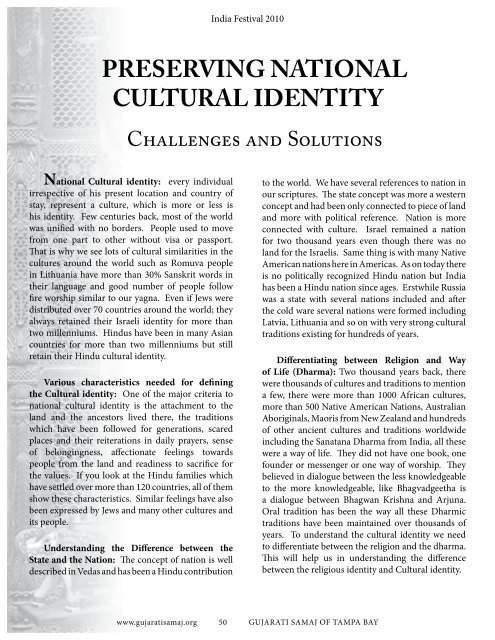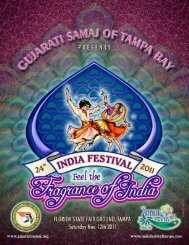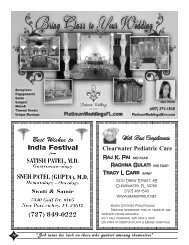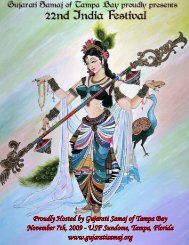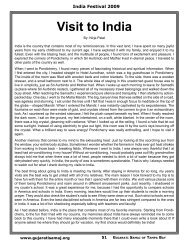You also want an ePaper? Increase the reach of your titles
YUMPU automatically turns print PDFs into web optimized ePapers that Google loves.
<strong>India</strong> <strong>Festival</strong> <strong>2010</strong><br />
PRESERVING NATIONAL<br />
CULTURAL IDENTITY<br />
Challenges and Solutions<br />
National Cultural identity: every individual<br />
irrespective of his present location and country of<br />
stay, represent a culture, which is more or less is<br />
his identity. Few centuries back, most of the world<br />
was unified with no borders. People used to move<br />
from one part to other without visa or passport.<br />
That is why we see lots of cultural similarities in the<br />
cultures around the world such as Romuva people<br />
in Lithuania have more than 30% Sanskrit words in<br />
their language and good number of people follow<br />
fire worship similar to our yagna. Even if Jews were<br />
distributed over 70 countries around the world; they<br />
always retained their Israeli identity for more than<br />
two millenniums. Hindus have been in many Asian<br />
countries for more than two millenniums but still<br />
retain their Hindu cultural identity.<br />
Various characteristics needed for defining<br />
the Cultural identity: One of the major criteria to<br />
national cultural identity is the attachment to the<br />
land and the ancestors lived there, the traditions<br />
which have been followed for generations, scared<br />
places and their reiterations in daily prayers, sense<br />
of belongingness, affectionate feelings towards<br />
people from the land and readiness to sacrifice for<br />
the values. If you look at the Hindu families which<br />
have settled over more than 120 countries, all of them<br />
show these characteristics. Similar feelings have also<br />
been expressed by Jews and many other cultures and<br />
its people.<br />
Understanding the Difference between the<br />
State and the Nation: The concept of nation is well<br />
described in Vedas and has been a Hindu contribution<br />
to the world. We have several references to nation in<br />
our scriptures. The state concept was more a western<br />
concept and had been only connected to piece of land<br />
and more with political reference. Nation is more<br />
connected with culture. Israel remained a nation<br />
for two thousand years even though there was no<br />
land for the Israelis. Same thing is with many Native<br />
American nations here in Americas. As on today there<br />
is no politically recognized Hindu nation but <strong>India</strong><br />
has been a Hindu nation since ages. Erstwhile Russia<br />
was a state with several nations included and after<br />
the cold ware several nations were formed including<br />
Latvia, Lithuania and so on with very strong cultural<br />
traditions existing for hundreds of years.<br />
Differentiating between Religion and Way<br />
of Life (Dharma): Two thousand years back, there<br />
were thousands of cultures and traditions to mention<br />
a few, there were more than 1000 African cultures,<br />
more than 500 Native American Nations, Australian<br />
Aboriginals, Maoris from New Zealand and hundreds<br />
of other ancient cultures and traditions worldwide<br />
including the Sanatana Dharma from <strong>India</strong>, all these<br />
were a way of life. They did not have one book, one<br />
founder or messenger or one way of worship. They<br />
believed in dialogue between the less knowledgeable<br />
to the more knowledgeable, like Bhagvadgeetha is<br />
a dialogue between Bhagwan Krishna and Arjuna.<br />
Oral tradition has been the way all these Dharmic<br />
traditions have been maintained over thousands of<br />
years. To understand the cultural identity we need<br />
to differentiate between the religion and the dharma.<br />
This will help us in understanding the difference<br />
between the religious identity and Cultural identity.<br />
www.gujaratisamaj.org 50 GUJARATI SAMAJ OF TAMPA BAY


